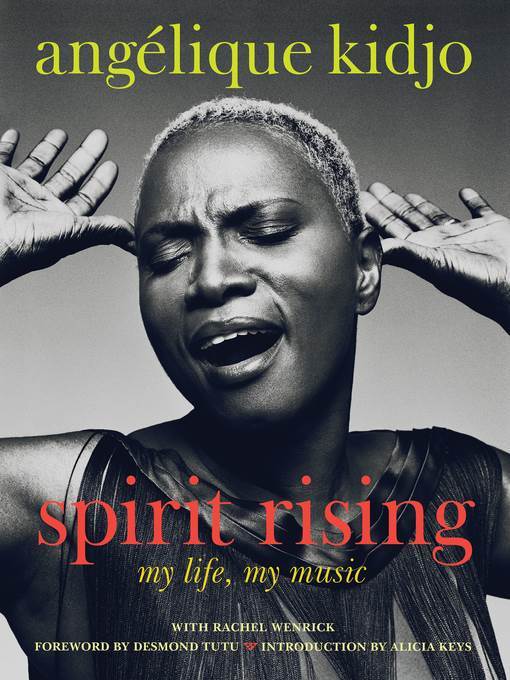
Spirit Rising
My Life, My Music
کتاب های مرتبط
- اطلاعات
- نقد و بررسی
- دیدگاه کاربران
نقد و بررسی

October 28, 2013
Opening with Kidjo’s childhood in Benin, a small country in West Africa, and concluding with a Carnegie Hall performance, this inspiring memoir is as much about the author’s love for family and homeland as it is about music. Growing up as one of 10 children, the aspiring musician was lovingly supported by her parents; her mother, who worked in theatre, put her on the stage to sing at age six; her father made sure his children were well educated, and her grandmother encouraged Kidjo to follow her heart, even when others disapproved. Though raised in a home that encouraged lively dialogue, Kidjo fled to France at the age of 23; Benin had fallen under communist rule and she could no longer freely practice her art. In Paris, she studied classical voice, built her reputation, met her future husband (Jean Hebrail, a bass player), and began to combine western and African music, establishing her own vibrant style. Eventually, she signed on with Island Records (and later with Columbia) and moved to New York. As her reputation grew and her music rose on the Billboard charts, the Grammy Award–winning Kidjo traveled the world as a U.N. Goodwill Ambassador, advocating for women’s rights and other issues. Fans and general readers will be enamored of this beautifully told tale of courage and determination, revealing an expansive life that proves “music has no color, no language, no boundaries.” Includes 125 illustrations.

December 15, 2013
A Grammy Award-winning Beninese singer/songwriter's heartfelt memoir, co-authored by Wenrick, about her life as a musician and human rights activist. Kidjo began her career in entertainment at age 6, when her mother pushed her onto a theater stage and told the little girl to sing. Terrified, the author quickly overcame her fears and realized that she had arrived "home." The singer began performing with her older brothers and immersing herself in music not only from Benin, but also Togo, France and the United States. Her great artistic awakening came a few years later after she heard Miriam Makeba singing on the radio. The legendary South African singer's "magical [and] uplifting" voice inspired the young Kidjo to become "just like her." After high school, Kidjo became a popular solo performer in both Benin and neighboring Togo, but her growing fame also brought her and her family under the scrutiny of an increasingly totalitarian Beninese government. At 23, she fled to Paris, where her path eventually led her to le CIM, the school for jazz. Kidjo pursued her interests in fusions that merged jazz, which fellow students told her "[wasn't] for Africans," with traditional African lyrics and rhythms. Her artistic boldness caught the attention of Island Records founder Chris Blackwell, who had discovered such world music icons as Bob Marley and U2. Like most of Blackwell's protegees, Kidjo also achieved international recognition. Yet it was only after she began doing humanitarian work in Africa for UNICEF that she was finally able to act on her long-standing need to give back to a land that had "given [her] so much." Richly illustrated throughout with black-and-white photographs, Kidjo's work celebrates one woman's courage to use her musical gift "to empower people all over the world." Warm, lively and compassionate.
COPYRIGHT(2013) Kirkus Reviews, ALL RIGHTS RESERVED.

February 1, 2014
Kidjo's memoir brims with the same joy, exuberance, and wisdom exhibited in her music while adding depth and insight into her art and life and the triumph of making connections through music. She grew up in Benin (West Africa), with a family full of songs and love. In order to continue to create her music, Kidjo fled a dictatorship and moved to France, where she struggled to support herself and against the "coolness toward African immigrants." She studied music, got married, and built on her interest in human rights. Through many collaborations--with Carlos Santana, Ziggy Marley, and Branford Marsalis, to name only a few--across cultures, styles, and countries, she details how she combines the music of Africa with music from the diaspora, extracted through slavery, constructing unique combinations and blending modern and traditional, roots and technology, jazz, and more with drums and complex rhythms at the center. She outlines how she has used her notoriety, as well as her predilection to speak her mind, to visit and advocate for women and children through UNICEF and her own foundation. VERDICT History, culture, and humanity come alive in the music and now in the Grammy winner's memoir. Highly recommended for fans of music and readers of African history.--Lani Smith, Ohone Coll. Lib., Fremont, CA
Copyright 2014 Library Journal, LLC Used with permission.

November 1, 2013
A Grammy Awardwinning singer, Benin-born Kidjo is celebrated for her deep appreciation of world cultures represented in her music and her abiding sense of justice. In a memoir as vivacious as she is, Kidjo recounts her journey from the western African nation to international stardom. She was thrust into the music business at the age of six, when her mother pushed her onstage to substitute for a sick performer. Kidjo's music was heavily influenced by Miriam Makeba and Aretha Franklin as well as a growing awareness of racial injustice in the U.S., South Africa, and her own country, then under a Communist regime. She fled to Paris rather than succumb to censorship and began an international career that brought her in contact with artists from James Brown to Harry Belafonte, from Carlos Santana to Alicia Keys. Kidjo writes beautifully of the spirituality of singing, the public giving of self to the audience, and the intimate opening of the self to the spirit. Photographs enhance this chronicle of the life of a vibrant singer and activist.(Reprinted with permission of Booklist, copyright 2013, American Library Association.)

























دیدگاه کاربران